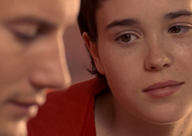"By the way, I fucking hate Goldfrapp."
Judge Marilyn Milian is never better, sassier, or more entertaining than when I have cause to procrastinate. And I've seen a lot of Her Honor lately as I've avoided writing about Hard Candy. My evasion hasn't been due to any strong disdain for the controversial new psycho-thriller, or its racy subject matter. It's the film's ultra-squeamy psychological setting that's kept me at a distance.
Most of the 99-minute runtime is inhabited by two very appealing actors playing decidedly unappealing characters: a whip-smart teen girl called Hayley (Ellen Page) and a 30something buck named Jeff (Patrick Wilson). Having developed a creepy and innuendo-heavy online relationship, the two meet up at a hip coffee shop… and believe me when I tell you there's more on the menu than lattes and scones.
It isn't long before the two wind up at Jeff's apartment, one of those who-can-really-afford-this? pads decorated with hard lines, primary colors, a Zen garden… and artful photographs of prepubescent girls. He's a fashion photographer, you see, and his work hints at a scandalous past which, as it turns out, is all too familiar to Hayley. Predator/prey roles are reversed, Jeff winds up drugged and tied to a chair (!), and the acid-tongued fille fatale goes to town with a very un-Milian type of rough justice. (When tethered and sweaty Jeff pleads that his professional rep will be kaput if Hayley calls the cops, she tartly begs to differ: "Didn't Roman Polanski just win an Oscar?")
Video and commercial director David Slade does a great job of bringing a visually stylish deviance to writer Brian Nelson's lurid story, inspired by real-life cases of Japanese schoolgirls turning the tables on older men trolling online for underage dates. Several shocking turns work aggressively to subvert our ethical bearings while never placing a judge's gavel firmly into our hands. Do we identify with this loony Lolita? Should we sympathize with the pervy photog? I switched sides often, and never really reached a verdict.
The tension is always fierce, but it's difficult to keep it up (so to speak) after the nerve-jangling sequence that everyone will be talking about soon, simply because the increasingly cartoonish Hayley's diabolical endgame stretches a bit too long. It all left me (a 30something homo with no kind of Hayley even possibly in my future) feeling sour and weird, so imagine my surprise at my (young, hetero) cinema companion's total elation during end credits. "That," he enthused, "was even better than the Mexican thing with the kids and the painting!"
He meant Duck Season.
Objection, Your Honor!
